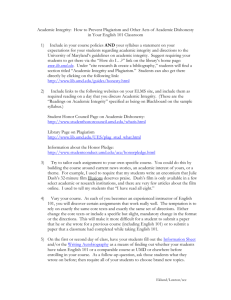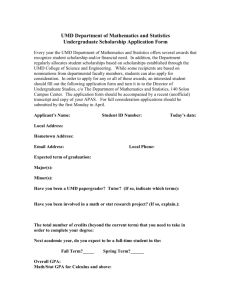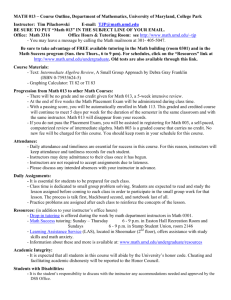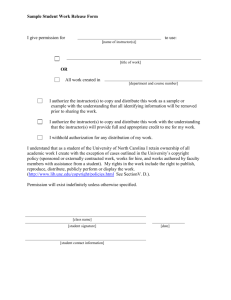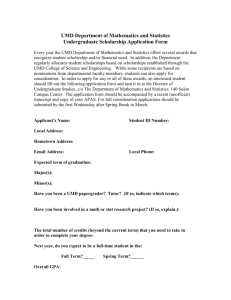14 Manning Hall
advertisement
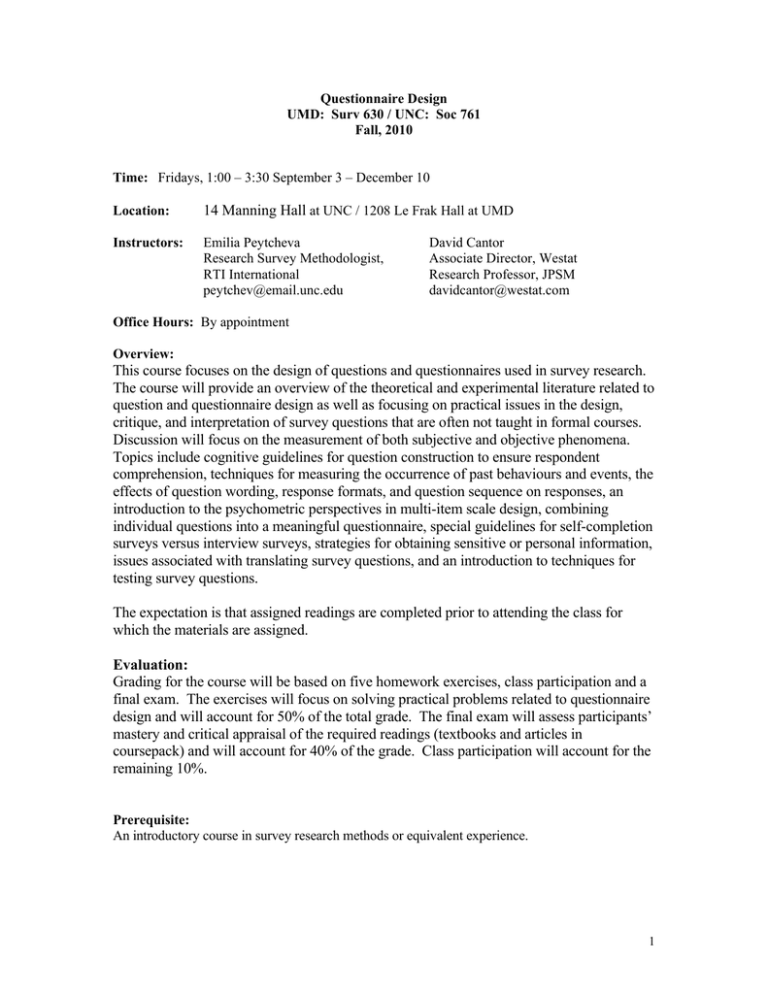
Questionnaire Design UMD: Surv 630 / UNC: Soc 761 Fall, 2010 Time: Fridays, 1:00 – 3:30 September 3 – December 10 Location: 14 Manning Hall at UNC / 1208 Le Frak Hall at UMD Instructors: Emilia Peytcheva Research Survey Methodologist, RTI International peytchev@email.unc.edu David Cantor Associate Director, Westat Research Professor, JPSM davidcantor@westat.com Office Hours: By appointment Overview: This course focuses on the design of questions and questionnaires used in survey research. The course will provide an overview of the theoretical and experimental literature related to question and questionnaire design as well as focusing on practical issues in the design, critique, and interpretation of survey questions that are often not taught in formal courses. Discussion will focus on the measurement of both subjective and objective phenomena. Topics include cognitive guidelines for question construction to ensure respondent comprehension, techniques for measuring the occurrence of past behaviours and events, the effects of question wording, response formats, and question sequence on responses, an introduction to the psychometric perspectives in multi-item scale design, combining individual questions into a meaningful questionnaire, special guidelines for self-completion surveys versus interview surveys, strategies for obtaining sensitive or personal information, issues associated with translating survey questions, and an introduction to techniques for testing survey questions. The expectation is that assigned readings are completed prior to attending the class for which the materials are assigned. Evaluation: Grading for the course will be based on five homework exercises, class participation and a final exam. The exercises will focus on solving practical problems related to questionnaire design and will account for 50% of the total grade. The final exam will assess participants’ mastery and critical appraisal of the required readings (textbooks and articles in coursepack) and will account for 40% of the grade. Class participation will account for the remaining 10%. Prerequisite: An introductory course in survey research methods or equivalent experience. 1 Required Texts 1. Fowler, F.J. Jr., (1995), Improving Survey Questions: Design and Evaluation, Applied Social Research Methods Series Volume 38, Thousand Oaks, CA: SAGE Publications. 2. Tourangeau, R., Rips, L.J., and Rasinski, K. (2000), The Psychology of Survey Response, Cambridge: Cambridge University Press. 3. Willis, G.B. (2005), Cognitive Interviewing: A Tool for Improving Questionnaire Design, Thousand Oaks, CA: Sage Publications, Inc. For UNC students, additional assigned articles will be available at the Reserve Room of the Undergraduate Library. For UMD students, some of these articles will be in a coursepack to be purchased by the student, and the remainder will be available on-line. Maryland students will get separate instructions on how to access these readings on the first day of class. Course Website: http://www.jpsm.umd.edu/surv630 Copies of the instructor's powerpoint slides will be available on the course website each week on the Thursday morning before the Friday afternoon class. In addition, homework assignments and the final exam will be posted to the website on the schedule outlined below. Reading Schedule September 3: Cognitive Processes Related to Answering Questions Instructor: Cantor teaching from UMD Assignment 1 available on the class website Willis, Chapters 2 and 3: pages 12 – 41. Tourangeau, et. al., Chapters 1 and 2 and pages 313 – 323. Krosnick, J. A. (1991) “Response strategies for coping with the cognitive demands of attitude measures in surveys.” Applied Cognitive Psychology, 5: 213-236. Sudman, S., Bradburn, N., and Schwarz, N. (1996). Thinking About Answers: The Application of Cognitive Processes to Survey Methodology, San Francisco: Jossey-Bass Publishers. Chapter 3, pages 80 – 99 and 100 – 162. September 10: Introduction, Measurement Error, Standardization, and Operationalizing Constructs Instructor: Peytcheva teaching from UNC Fowler, Chapter 1: pages 1 – 7. Aday, L.A. (1996). Designing and Conducting Health Surveys: A Comprehensive Guide, San Francisco: Jossey-Bass. Chapter 2: pages 25 – 43. 2 Fowler, F. and Mangione, T. (1990), Standardized Survey Interviewing: Minimizing InterviewerRelated Error, Newbury Park: Sage. Chapter 5, pages 77 – 95. Sudman, S., Bradburn, N., and Schwarz, N. (1996). Thinking About Answers: The Application of Cognitive Processes to Survey Methodology, San Francisco: Jossey-Bass Publishers. Chapter 3, pages 55 – 79. Bradburn, N. (2004). “Understanding the Question-Answer Process,” Survey Methodology, vol. 30, no. 1, pp 5 – 15. September 17 and September 24: Writing Factual and Behavioral Questions / Memory Issues Instructor: Peytcheva (teaching from UMD on 9/17 and from UNC on 9/24) Assignment 1 due by 4:30 pm on 9/17 Assignment 2 available on the class website on 9/17 9/17 Fowler, Chapter 2, pages 8 – 33 only. Tourangeau, et. al., Chapters 3 – 5, pages 62 – 164 and Chapter 8, pages 230 – 249 only 9/24 Shober, M. and Conrad, F. (1997). Does Conversational Interviewing Reduce Survey Measurement Error? Public Opinion Quarterly, 61, 576 – 602. Belli, R.F. (1998). The Structure of Autobiographical Memory and the Event History Calendar: Potential Improvements in the Quality of Retrospective Reports in Surveys, Memory, 6, 383 – 406. Loftus, E. and Marburger W. (1983). Since the Eruption of Mt. St. Helens, Has Anyone Beaten You Up? Improving the Accuracy of Retrospective Reports with Landmark Events, Memory and Cognition, 11, 114 – 120. Martin, E. DeMaio, T., and Campanelli P. (1990). Context Effects for Census Measures of Race and Hispanic Origin, Public Opinion Quarterly, 54, 551 – 566. October 1 and October 8: Constructing Attitude and Other Non-Factual Questions Instructor: Cantor (teaching from UNC on 10/1 and from UMD on 10/8) Assignment 2 due by 4:30 pm on 10/1 Assignment 3 available on the class website on 10/8 10/1: Tourangeau, Rips, & Rasinski (2000), Chapters 6, 7, 239-254 3 Fowler (1995), Chapter 3. 10/8: Alwin, D.F., & Krosnick, J.A. (1991). The Reliability of Survey Attitude Measurement. Sociological Methods & Research, 20, 139-181. Schuman, H. (1972). Attitudes vs. Actions Versus Attitudes vs. Attitudes. Public Opinion Quarterly, 36, 347-354. Schwartz, Norbert, Knäuper, B., Hippler, H.J., Noelle-Neumann, E. and F. Clark (1991) “Rating Scales: Numeric Values May Change the Meaning of Scale Labels.” Public Opinion Quarterly 55: 618-630. October 15: Questionnaire Pretesting Methods Instructor: Cantor (teaching from UMD) Assignment 3 due by 4:30 pm Assignment 4 available on the class website Willis (2005) Chapters 1, 4, 5, and 14. Fowler, (1995), Chapters 5 and 7 . Fowler, F.J. (2004) “The Case for More Split-Sample Experiments in Developing Survey Instruments.” In Presser, S., Rothgeb, J.M., Couper, M.P., Lessler, J.T., Martin, E., Martin, J. and E. Singer (eds) Methods for Testing and Evaluating Survey Questionnaires. Hoboken, NJ: John Wiley & Sons, pp. 173 – 188. Esposito, J.L. and J. M. Rothgeb (1997) “Evaluating Survey Data: Making the Transition from Pretesting to Quality Assessment.” Lyberg, L., Biemer, P., Collins, M., de Leeuw, E., Dippo, C., Schwarz, N. and D. Trewin (eds) Survey Measurement and Process Quality. New York: John Wiley & Sons. pp. 541 – 572. October 22: FALL BREAK – NO CLASS October 29: Sensitive Questions and Designing Questionnaires for Children Instructor: Peytcheva(teaching from UNC) Fowler, Chapter 3: pages 33 – 44 only Tourangeau, et. al., Chapter 9: pages 255 – 288. Schaeffer, N.C. (2000) Asking Questions About Threatening Topics: A Selective Overview, in Stone, A., Turkkan, J.S., Bachrach, C.A., Jobe, J.B., Kurtzman, H.S., and Cain, V.S. (eds.), The Science of Self-Report, Implications for Research and Practice. Lawrence Erlbaum Associates: Mahwah, New Jersey. 4 Tourangeau, R. and Smith, T. W. (1996). Asking Sensitive Questions, Public Opinion Quarterly, volume 60, no. 2, 275 – 321. deLeeuw, E., Borgers, N., and Smits, A. (2004). Pretesting Questionnaires for Children and Adolescents, in Presser, S., Rothgeb, J., Couper, M., Lessler, J., Martin, E., Martin, J., and Singer, E. (eds.) Methods for Testing and Evaluating Survey Questionnaires, New York: John Wiley and Sons, Chapter 20: pages 409 – 429. November 5: Design of Self-Administered Questionnaires Instructor: Cantor (teaching from UMD) Assignment 4 due by 4:30 pm Assignment 5 available on class web site Jenkins, C. and Dillman, D. (1997). Towards a Theory of Self-Administered Questionnaire Design, In L. Lyberg, P. Biemer, M. Collins, E. DeLeeuw, C. Dippo, N. Schwarz, and D. Trewin (eds.), Survey Measurement and Process Quality, New York: John Wiley and Sons, Chapter 7: pages 165 – 196. Dillman, D. (2000). Mail and Internet Surveys: The Tailored Design Method. New York: John Wiley and Sons. Chapter 3: pages 79 – 140. November 12: Web Surveys Instructor: Cantor (teaching from UNC) Couper, M.P., Traugott, M.W., & Lamais, M.J. (2001), Web Survey Design and Administration, Public Opinion Quarterly, 65, 230-253. Smyth, J.D., Dillman, D.A., Christian, L. M. and M. Stern (2006) “Comparing Check All and Forced Choice Question Formats in Web Surveys,”Public Opinion Quarterly, 70: 66 – 77. November 19: Special Issues When Designing Questionnaires for Computer-Assisted Data Collection Instructor: Peytcheva (teaching from UMD) Assignment 5 due by 4:30 pm Tourangeau, et. al., Chapter 10: pages 289 – 312. House, C. (1985). Questionnaire Design With Computer Assisted Telephone Interviewing, Journal of Official Statistics, vol. 1, no. 2, pages 209 – 219. Kinsey, S. and Jewell, D. (1998). A Systematic Approach to Instrument Development in CAI, in Couper, M. Baker, R., Bethlehem, J., Clark, C., Martin, J., Nicholls, W., and O'Reilly, J. (eds.) Computer Assisted Survey Information Collection, New York: John Wiley and Sons, Chapter 6: 105 – 123. November 26: THANKSGIVING BREAK 5 December 3: Pretesting Methods for CAI / Translation Issues Instructor: Peytcheva (teaching from UNC) Final Exam Available on the class website Couper, M. (1999). The Application of Cognitive Science to Computer Assisted Interviewing, in Sirken, M., Hermann, D., Schechter, S., Schwarz, N., Tanur, J., and Tourangeau, R. (eds.), Cognition and Survey Research, New York: John Wiley and Sons. – Pages 277 – 300. Hansen, S.E., and Couper, M. (2004). Usability Testing To Evaluate Computer-Assisted Instruments, in in Presser, S., Rothgeb, J., Couper, M., Lessler, J., Martin, E., Martin, J., and Singer, E. (eds.) Methods for Testing and Evaluating Survey Questionnaires, New York: John Wiley and Sons, Chapter 17: pages 337 – 360. Harkness, J., (2003). Questionnaire Translation, in Harkness, et. al, (eds), Cross-Cultural Survey Methods, New York: Wiley. - Pages 35 – 56. Smith, T. (2003). Developing Comparable Questions in Cross-National Surveys, in Harkness, et. al, (eds), Cross-Cultural Survey Methods, New York: Wiley. - Pages 69 – 91. December 10: FINAL EXAM DUE 6
